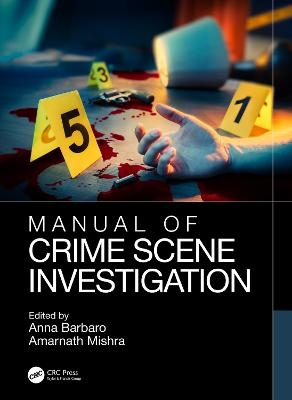
Manual of Crime Scene Investigation
CRC Press (Verlag)
978-1-032-31555-3 (ISBN)
- Titel z.Zt. nicht lieferbar
- Versandkostenfrei
- Auch auf Rechnung
- Artikel merken
Over the past several years, myriad manuals on crime scene investigations have been published with each focusing on select, or partial, aspects of the investigation. Crime scene investigation, done right, is a multi-faceted process that requires various forms of evidence to be collected, examined, and analyzed. No book available has addressed procedures to present global best practices by assembling a collection of international experts to address such topics.
Manual of Crime Scene Investigation is a comprehensive collaboration of experts writing on their particular areas of expertise as relates to crime scenes, evidence, and crime scene investigation. The book outlines best practices in the field, incorporating the latest technology to collect, preserve, and enhance evidence for appropriate analysis. Various types of forensic evidence are addressed, covering chain of custody, collection, and utility of such evidence in casework, investigations, and for use in court. The approach, and use of international contributor experts, will appeal to a broad audience and be of use to forensic practitioners, and the forensic science community worldwide.
Key features:
• Assembles an international team of contributing author experts to present the latest developments in their crime scene field of specialty
• Examines global best practices and what are consistently the most reliable tactics and approach to crime scene evidence collection, preservation, and investigation
• Provides numerous photographs and diagrams to clearly illustrate chapter concepts
Manual of Crime Scene Investigation serves as a vital resource to professionals in police science and crime scene investigations, private forensic institutions, and academics researching how better real-world application of techniques can improve the reliability and utility of evidence upon forensic and laboratory analysis.
Dr. Anna Barbaro holds a PhD in Forensic Genetics from the University of Santiago de Compostela, Spain, as well as a diploma of expertise in Criminal Investigation, a diploma in Intermediate Crime Scene Investigation, and a diploma in Criminalistics, specializing in crime scenes. She has served as Director of the Forensic Genetics Dept. at Studio Indagini Mediche e Forensi (SIMEF) in Italy and as a post-doctoral Researcher at the University of Alcalà (Spain), and she is currently professor of Forensic Genetics in degree or post degree courses on Forensic Science and an expert Consultant for Italian Penal and Civil Tribunals. Dr. Barbaro is the President of the Worldwide Association of Women Forensic Experts (WAWFE), and honored member of several international association, and an author of more than 100 papers. She also serves as Editorial Board Member and reviewer for several international scientific Journal. Dr. Barbaro has previously written and edited several books, most recently editing the book Manual of Forensic Science (2017) published by CRC Press/ Taylor&Francis, the Manual of Criminalistics and Criminology (2020) published by Tébar Flores (Spain), and the Manual of Criminalistics and Criminology (2021) by Ecoe Ediciones (Colombia). Dr. Amarnath Mishra holds a PhD in Forensic Science with specialization in Forensic and Analytical Toxicology from the Sam Higginbottom University of Agriculture, Technology & Sciences, Prayagraj (Formerly SHIATS, Allahabad) in collaboration with the Central Forensic Science Laboratory, Chandigarh, MHA, Govt. of India. He is currently a Senior Faculty of Forensic Science at Amity University Uttar Pradesh, Noida, India since August 2015. Prior to this, he was Associate Professor at Tribhuvan University, National Medical College, Lecturer at Kathmandu University, Nepal, in additional to service as visiting professor or several other universities. Dr. Mishra has published 5 books, 20 book chapters, and more than 35 research articles and belongs to numerous national and international professional associations, having also served as a legal freelance forensic and medico-legal expert and consultant. He has also participated in TV and radio programs as a Forensic Expert and is founder of Aspire Forensics and Amar Educational and Social Welfare Trust.
1: Crime Scene Management 2: Crime Scene Reconstruction 3: The Role of the Medical Examiner in Crime Scene Investigation 4: Archaeological Evidence Collection and Site Documentation 5: Biological Evidence Collection 6: Blood Spatter Analysis 7: Botanical Evidence Collection 8: Toxicological Evidence Collection 9: Digital Evidence Collection 10: Entomological Evidence Documentation, Collection, and Preservation 11: Fiber evidence Collection 12: Finger and Palm Marks: Development and Recovery 13: Firearms Evidence Documentation and Handling 14: Trace Evidence Collection 15: Rapid DNA Analysis at Crime Scenes 16: Animal Crime Scene Investigation: Procedures and Constructive Contributions 17: Odontological Evidence Collection App A: Contextualizing the Education of Crime Scene Investigators App B: Vicarious Traumatization and the Crime Scene Investigator
| Erscheinungsdatum | 13.10.2022 |
|---|---|
| Zusatzinfo | 10 Tables, black and white; 25 Line drawings, color; 3 Line drawings, black and white; 144 Halftones, color; 8 Halftones, black and white; 169 Illustrations, color; 11 Illustrations, black and white |
| Verlagsort | London |
| Sprache | englisch |
| Maße | 210 x 280 mm |
| Gewicht | 1360 g |
| Themenwelt | Naturwissenschaften ► Biologie |
| Recht / Steuern ► EU / Internationales Recht | |
| Recht / Steuern ► Strafrecht ► Kriminologie | |
| Recht / Steuern ► Strafrecht ► Strafverfahrensrecht | |
| Sozialwissenschaften ► Soziologie | |
| ISBN-10 | 1-032-31555-5 / 1032315555 |
| ISBN-13 | 978-1-032-31555-3 / 9781032315553 |
| Zustand | Neuware |
| Haben Sie eine Frage zum Produkt? |
aus dem Bereich


